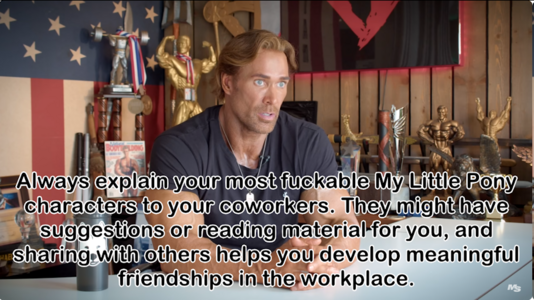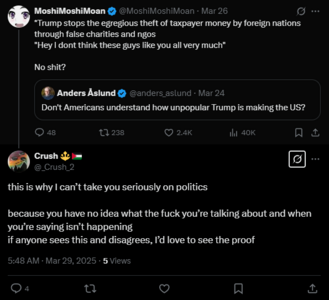he got at least 2 he's still going.Mofo is just looking for petty points and wants everyone to him read like a open book. Nolan needs to learn private affair should stay private, but who am I kidding? Guy will never stop being a self-righteous retard until he gets a big fat slap of reality.
"Feet are disgusting"Fujikura Uruka
You are using an out of date browser. It may not display this or other websites correctly.
You should upgrade or use an alternative browser.
You should upgrade or use an alternative browser.
The Nolan Crush Memorial Post Dump and Lolcow Thread
- Thread starter reinigen
- Start date
Someone should take the various edits of that picture and put them into one of those morphing gif things, or a short looping video....Alternatively, after your AI-generated gooning, make AI-generated Nolan edits.
View attachment 93207View attachment 93208
I'm not about to learn video editing software any time soon, but maybe there's something like a gimp plugin...
Last edited:
After first day of work, Nolan still have energy to sperg on twitter  :
:

Archive
Raging at Mr Metokur due to his political comments

Archive

Archive
Nolan you retard, Canada isn't better, and will you ever go outside of Ohio?

Archive
I am not NIJISISTER now, but Hololive Mumei's biggest fan now,



Archive
People found out Nolan try to made some petty replies at old post, and he is sperging out

Archive
 :
:Archive
Raging at Mr Metokur due to his political comments
Archive
Archive
Nolan you retard, Canada isn't better, and will you ever go outside of Ohio?

Archive
I am not NIJISISTER now, but Hololive Mumei's biggest fan now,



Archive
People found out Nolan try to made some petty replies at old post, and he is sperging out

Archive
Attachments
Do you want funny and horny nolan response, or do you want Pony fucker response who is sensitive to horse topic?

Nolan is Right for once.

Nolan: Dietary assistance job is too much for me. I have too many things to learn and it is too hard for me!




Do you think Nolan showed pony clopping picture or futa picture to his coworker? That would be glorious to let people know he is a pony fucker!!!



Do you think Nolan showed pony clopping picture or futa picture to his coworker? That would be glorious to let people know he is a pony fucker!!!

Nolan: Dietary assistance job is too much for me. I have too many things to learn and it is too hard for me!
View attachment 93624
Do you think Nolan showed pony clopping picture or futa picture to his coworker? That would be glorious to let people know he is a pony fucker!!!

time is a flatcircle.time is a flatcircle.time is a flatcircle.time is a flatcircle.time is a flatcircle.time is a flatcircle.time is a flatcircle.
The things he wanted to do:Nolan: Dietary assistance job is too much for me. I have too many things to learn and it is too hard for me!
View attachment 93624
Do you think Nolan showed pony clopping picture or futa picture to his coworker? That would be glorious to let people know he is a pony fucker!!!
- Find new Discords to spam
- Pitypost about his father's transgressions the night before
- Spam stream links on TvTropes and any other forum he's not banned from yet
- Destroy chuds and slobber over lolis on X
Nolan should profit from the current administration's anti DEI policies and get hired by the NNSA to replace, let's say, Shekita Robinson.
Give him a job where he can really shine.
Give him a job where he can really shine.
Nolan is the ultimate DEI, retarded but white.Nolan should profit from the current administration's anti DEI policies and get hired by the NNSA to replace, let's say, Shekita Robinson.
Give him a job where he can really shine.
You're forgetting his massive faggotryNolan is the ultimate DEI, retarded but white.
This little retard couldn't make it through his first day of work without seething uncontrollably because he's torn away from his computer and embarrasses himself.Nolan: Dietary assistance job is too much for me. I have too many things to learn and it is too hard for me!
View attachment 93624
Do you think Nolan showed pony clopping picture or futa picture to his coworker? That would be glorious to let people know he is a pony fucker!!!
ONE. FUCKING. DAY.
"It is okay Nolan, we won't laugh at you because you showed us your Pony clopping picture" - Nolan's coworker
But in reality, his co-worker probably start judging Nolan's behaviour and his sexual preferences now
Second day only, Nolan already complaining his job because he need to use his unwashed bare hand now to prepare the meal!

Satanic Verses? What the fuck was that?

 en.wikipedia.org
en.wikipedia.org

Oh........ Oh........
That might explain while Nolan is so violent, and prefer to use violence to solve his issue such as beating his suicide victim......

But in reality, his co-worker probably start judging Nolan's behaviour and his sexual preferences now

Second day only, Nolan already complaining his job because he need to use his unwashed bare hand now to prepare the meal!

Satanic Verses? What the fuck was that?

The Satanic Verses - Wikipedia
Oh........ Oh........
That might explain while Nolan is so violent, and prefer to use violence to solve his issue such as beating his suicide victim......

How old is Nolan again? He's going to need to learn real quick that his job is more important than missing some karaoke's.
Last edited:
The Satanic Verses is fundamentally a fantasy novel about two Bollywood actors magically spared from a terrorist attack (by Sikhs, who aren't even Muslim btw) by becoming the archangel Gabriel and the Devil, respectively, and coming into conflict with each other as a result, as well as the possibility everything may just be in their heads. The "Satanic Verses" make up only the framing of the story, where flashbacks to Muhammad show him still worshipping the old pagan idols of pre-Islamic Arabia, before renouncing them as a work of the Devil, setting the stage for the conflict of the main story.Oh........ Oh........
That might explain while Nolan is so violent, and prefer to use violence to solve his issue such as beating his suicide victim......
Somehow this was enough to warrant a fatwa by the Ayatollah of Iran. The novel was written by a lapsed Muslim who understood the ridiculousness of his religion, and got turned into Punished Snake for it.

This pic goes hard as fuck btw
Nolan could very well become the first person to read the Satanic Verses and not get redpilled on Islam by virtue of being too unintelligent to understand how ridiculous it is that this creative and innocuous novel caused an entire religion to declare war on a single apostate for daring to explore their prophet in a way that deviates from scripture, as if that "religion" is really more of a death cult that cannot moderate or accept criticism in the same way Christianity did.
Last edited:
Let me just say, I am loving the current season of Retardius Maximus starring Nolan Crush though the foreshadowing could be better, a little subtler if you will. I think they're going for that mid season break climax where Nolan gets fired two weeks into his job and gets beaten up by his dad then tardrages in X and discord. Dunno if they're going for the twist of Nolan sucker punching his old man and permanently injuring him thus asserting his dominance in the family or he just retreats further into the cybervoid. Whatever happens, it'll be great cinema.
It's pretty much because the idea of Satanic Verse in itself (tl;dr the idea that Muhammad (PBUH) mistakenly bringing pagan gods into early muslim teaching and it could possibly stuck in the teaching all the way to present day) is already controversial in itself with most modern muslims scholars agreed that it was bullshit but was accepted during the old, early days of the time (for whatever complicated reasons).The "Satanic Verses" make up only the framing of the story, where flashbacks to Muhammad show him still worshipping the old pagan idols of pre-Islamic Arabia, before renouncing them as a work of the Devil, setting the stage for the conflict of the main story.
Somehow this was enough to warrant a fatwa by the Ayatollah of Iran. The novel was written by a lapsed Muslim who understood the ridiculousness of his religion, and got turned into Punished Snake for it.
The book pretty much bringing that thing into spotlight (despite being mostly a framework of a different plot), and some of them muslims especially the middle eastern one are definitely not happy with it, resulting with the whole fatwa and assassination attempts.
I don't think Nolan will understand the nuances of it, if at all, because if he does take it at face value then he might as well ditch the "stand with palestine" thing.
Nolan could very well become the first person to read the Satanic Verses and not get redpilled on Islam by virtue of being too unintelligent to understand how ridiculous it is that this creative and innocuous novel caused an entire religion to declare war on a single apostate for daring to explore their prophet in a way that deviates from scripture, as if that "religion" is really more of a death cult that cannot moderate or accept criticism in the same way Christianity did.
Christianity didn't exactly moderate or accept criticism on its own. It just lost. From the fall of the western Roman empire until the reformation it set the rules and enforced them, through violence if need be. The reformation then led to 1 1/2 centuries of total war during which the church tried to maintain its doctrinal monopoly. It lost.
Westphalia set up the supremacy of the state over religion. Christianity simply wasn't given a choice on the matter. Everything that followed after Westphalia (secularism, liberalism) was simply its consequences thought further and the church (es, at this point) being unable to stop it.
The muslim world is experiencing this conflict, too, roughly since 1920, with iberalisation attempts in Iran and Afghanistan (twice, for the latter), Arab nationalism/socialism in Egypt, Libya, Syria, Iraq, Yemen, Algeria had its own thing going...
Difference is, this same conflict playing out in the Arab world had the opposite result. The states lose, the madrassas win. The only reason there isn't a fundamentalist muslim superstate from Iraq to Morocco is that American bombs keep blowing up the people who are trying to build it.
There are some very old differences between mainstream Christian and mainstream Muslim philosophy, as the long conflict between pure faith and faith through natural philosophy was won by the latter in Christianity (over the course of 1200 years from Augustine of Hippo to Kepler, mind you), while that same conflict in Islam was won by the former between ca. 900 AD and 1300 AD. There is also something to be said for Christianity being quantifiably more liberal than Islam essentially since its inception. Not liberal by any post Westphalian definition of that term, but relatively more liberal than Islam.
But modern Christianity didn't become what it is through choice.
Rather, it was defanged because states forced it to submit with cannons and gunfire.
Westphalia set up the supremacy of the state over religion. Christianity simply wasn't given a choice on the matter. Everything that followed after Westphalia (secularism, liberalism) was simply its consequences thought further and the church (es, at this point) being unable to stop it.
The muslim world is experiencing this conflict, too, roughly since 1920, with iberalisation attempts in Iran and Afghanistan (twice, for the latter), Arab nationalism/socialism in Egypt, Libya, Syria, Iraq, Yemen, Algeria had its own thing going...
Difference is, this same conflict playing out in the Arab world had the opposite result. The states lose, the madrassas win. The only reason there isn't a fundamentalist muslim superstate from Iraq to Morocco is that American bombs keep blowing up the people who are trying to build it.
There are some very old differences between mainstream Christian and mainstream Muslim philosophy, as the long conflict between pure faith and faith through natural philosophy was won by the latter in Christianity (over the course of 1200 years from Augustine of Hippo to Kepler, mind you), while that same conflict in Islam was won by the former between ca. 900 AD and 1300 AD. There is also something to be said for Christianity being quantifiably more liberal than Islam essentially since its inception. Not liberal by any post Westphalian definition of that term, but relatively more liberal than Islam.
But modern Christianity didn't become what it is through choice.
Rather, it was defanged because states forced it to submit with cannons and gunfire.
Similar threads
- Replies
- 2K
- Views
- 135K
- Replies
- 0
- Views
- 2K
- Replies
- 905
- Views
- 57K
- Replies
- 2
- Views
- 7K


